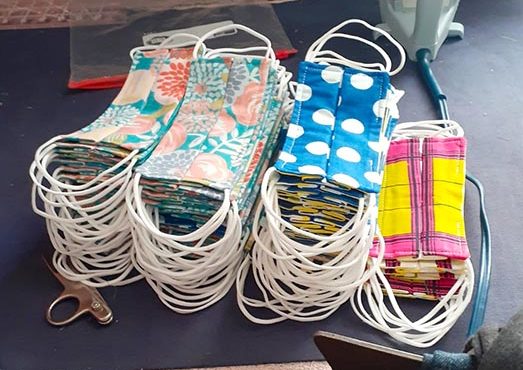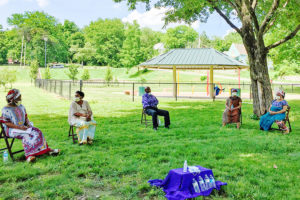



It’s a glimpse of power. The power of capacity building, of relationship building, of consultation, of collective will to improve things in a neighborhood.
When the implications of the COVID-19 pandemic began to be felt in the Historic Northeast neighborhood of Kansas City, Missouri, a few people arose in response to rumors and misinformation about the coronavirus. What followed was the creation and systematic sharing of an informative video in Swahili, community gatherings, and a campaign using the skills of residents to make protective masks for 139 households.
One factor was crucial in making the effort work for everyone: an appeal to a sense of justice, trustworthiness and other spiritual strengths.
Relationships already built
It began in March. Congolese immigrants in the neighborhood had been building community and strengthening their relationships for about four years through a Baha’i-inspired system of devotional life and spiritual education.
A team of Baha’is and friends saw that the population, which mostly spoke Swahili, was becoming vulnerable to misinformation about the encroaching health crisis.
So several friends gathered to consult about the situation, including Dr. Mwamba, a local resident who had been a practicing physician in the Democratic Republic of the Congo and Tanzania.
Known affectionately as “baba,” Dr. Mwamba has been involved alongside his family in the community-building process. “He had deep trust of the Bahá’ís, especially the ones serving in the neighborhood, because he saw how they sacrificially served, cared and were concerned with the betterment of the community,” says Suzanne Schleifman, a Baha’i who has visited several times from out of state to help translate.
In turn, the doctor encouraged others to share in that trust, “since the Congolese community respects and trusts baba,” she says.
He was interviewed in the informational video, primarily in Swahili. It addressed basic ways to protect against the virus, common misconceptions, and the need for families to take care of their spiritual as well as physical well-being.
The friends in the neighborhood shared the video through social media, and a local nonprofit organization adopted the video as a tool to raise awareness among the families it serves.
The next step in service
“There was still a great need for ongoing conversations about the virus,” says Nasim Ahmadiyeh, a Baha’i and also a doctor, who lives in the area and has been closely involved.


So Dr. Mwamba agreed to call together a community meeting to consult on how the people could be protected. It would include pastors, a leadership committee in the Congolese community, and a representative of the Local Spiritual Assembly, the Kansas City Baha’i community’s governing council. Dr. Mwamba and Schleifman collaborated with Ahmadiyeh and Afsaneh Zaeri, who serves as an Auxiliary Board member, to organize the meeting.
Before that meeting could take place, though, it became clear late in May that COVID-19 had broken out among hundreds of workers at a factory, including several from Congolese families participating in the community-building process. They didn’t have masks, and the employer wasn’t providing them.
That made the June 6 gathering in a park highly timely. Many who had been placed on leave from their jobs were in attendance, with safety measures being carefully observed.
“Though we are a marginalized community, we cannot wait for others to rescue us. We have connections, resources, and the ability to consult and reflect on our efforts,” Dr. Mwamba reminded them.
Baha’is talked about the concept of the oneness of humanity to help set the tone. A representative of the Spiritual Assembly described its role in caring for the community.
There was a question-and-answer session about the virus, which still wasn’t well understood within the community.
Material needs were identified, primarily masks. A tailor showed the group masks he had made, and others skilled in sewing started a discussion on how quickly they could produce masks and how they could be paid for their effort.
There was also discussion about how to meet spiritual needs when churches were closed, and pastors encouraged people to keep praying at home.
Among next steps was to find out exactly how many people and households were in the community, so that any efforts could be systematic. The group determined about 700 masks would be needed.
“The meeting was joyful and many expressed how they wished to have had such a gathering much earlier to begin working towards the prosperity of the community in unity,” Schleifman says.
Practical steps, spiritual principles


A social justice club, founded by a local youth, raised money through sale of donated artworks, and that paid for fabric and labor for 250 masks.
A second community gathering took place June 27, two days before a city-ordered mask mandate was to go into effect.
With that first batch of masks in hand, the gathering pondered a potentially thorny question: What if some families took more than they needed and others came up short?
Schleifman was invited to talk on the nature of spiritual and material progress, and how spiritual capacities — such as those built in the community-building process — were an essential foundation for community efforts.
Discussion led the group to conclude that this was a matter of justice and trustworthiness, and that the entire project was a spiritual enterprise.
The committee then delegated one of its members, along with a youth staying in the neighborhood for a period of service, to distribute the first 250 masks the following day and ensure all 139 involved households were supplied.
Later that month, more were made and distributed thanks to a donation from a local nonprofit organization.
“We envision this as an ongoing collaborative process, including future community gatherings, to address other questions of well-being,” Ahmadiyeh says.


![]()
![]()
Whether you are exploring the Bahá'í Faith or looking to become an active member, there are various ways you can connect with our community.
Please ensure that all the Required Fields* are completed before submitting.